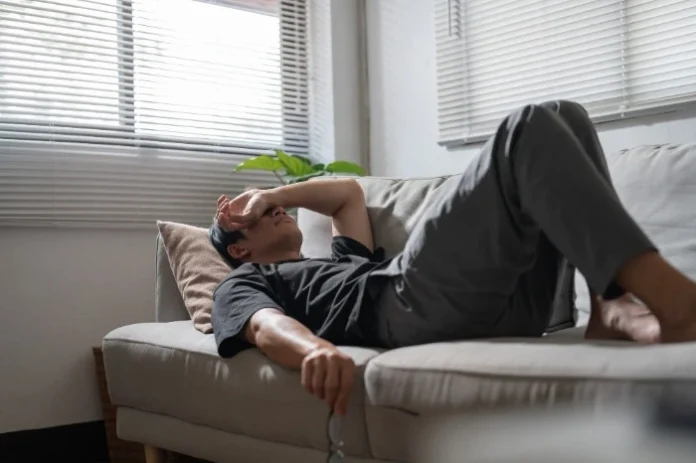Socializing can be a lot of fun, whether it’s watching the game with friends, having a drink after work, enjoying a board or card game, or simply sitting around the table and having a coffee and a chat. However, for people with social anxiety, the thought of socializing can be crippling.
If you experience social anxiety that is holding you back from enjoying life and social times, this article is for you. We’ll explain what social anxiety is and how you can put a stop to it.
What is Social Anxiety?
Anxiety disorders impact nearly 1 in 5 American adults every year. Someone with an anxiety disorder, such as Generalized Anxiety Disorder (GAD) or social anxiety disorder (SAD or social phobia), tends to have feelings of fear, uncertainty, and worry that interfere with their everyday lives and activities and tend to last more than six months. For those with social anxiety, the anxiety manifests in social settings only, whereas they are usually fine by themselves.
To diagnose GAD or SAD, a doctor or mental health clinician will look for several symptoms, including excessive, difficult-to-control worry, which occurs most days over six months. For SAD, the excessive worry needs to be centred around social settings or the thought of social settings. If this is the case, someone may experience the following in a social setting:
- Muscle tension
- Headaches
- Sweaty palms
- Difficulty concentrating or making decisions
- Increased heart rate
- Nausea
- Insomnia
- Digestive issues
- A sense of immediate danger or impending doom
Social Anxiety Triggers
There can be a range of triggers for people who experience social anxiety, which are quite similar to other stressors in life.
For instance, caffeine consumption, such as a coffee date or coffee with a friend, can trigger social anxiety, as can a social setting such as a dinner party, a bigger party, or work function.
Other triggers can include the mere thought of a social situation if someone’s social anxiety is severe.
Many people with social anxiety find it hard to start conversations or know what to say or how to answer questions about themselves, which can make parties or networking events stressful.
One major trigger that many people experience is public speaking — whether it’s giving a presentation at work or simply introducing yourself in a group setting, the pressure of having all those eyes focused on you can be overwhelming for folks with social anxiety.
Another common trigger is being the centre of attention, even in smaller settings.
Something as basic as walking into a room where others are already seated or being asked a question in front of a group can make someone with social anxiety feel exposed and nervous.
Furthermore, performance situations such as eating in front of others, writing while someone is watching, or being observed while doing a task, can also provoke strong anxiety, often tied to fear of doing something embarrassing or being judged harshly for mistakes.
How to Combat Social Anxiety
The next section of this article will share some ways that you can put a stop to social anxiety.
See A Mental Health Professional
You may want to talk to a mental health professional, such as a clinician who has completed an online counseling degree or another mental health-related qualification, such as social work or psychology.
The most common psychotherapy for social anxiety that a counsellor will use is cognitive behavioural therapy (or CBT), which is a talking therapy that aims to change thought patterns that may be maladaptive or disordered and change the associated behavior that connects to the thoughts.
For instance, in CBT, you might unpack thoughts like “I’m not fun” or “I will seem stupid” as they relate to socializing and see how these thoughts are fundamentally flawed, leading to your social anxiety.
Even just talking about your social anxiety with a compassionate and understanding professional can be enough to help treat it.
Another therapy is exposure therapy, which can be useful for social phobias or GAD by confronting anxiety triggers in a safe, measured, and controlled way to disrupt the cycle of fear associated with the trigger.
For instance, catching up with a friend in a contained setting, such as your home, or trying a small outing with a few close friends.
Medications for Anxiety
When it comes to medications to treat social anxiety, benzodiazepines can be prescribed by a physician or a psychiatrist as a short-term measure to manage social anxiety or panic attacks.
Still, these meds shouldn’t be used long-term due to their addictive nature, as they can cause dependence after two or more weeks and have nasty withdrawal symptoms.
They are best used as a short-term treatment for severe social anxiety. A non-addictive option is Selective Serotonin Reuptake Inhibitors, or SSRIs, which take longer to work (around 4-8 weeks) but are proven to manage anxiety as well as depression. These medications are brand-named as things like Prozac or Lexapro.
In Summary
This helpful article has shared all about social anxiety and how you can stop it. We’ve described what social anxiety is, some of the key triggers for it, and how you can treat it through a combination of talk therapy, such as CBT, exposure therapy, and medications.





